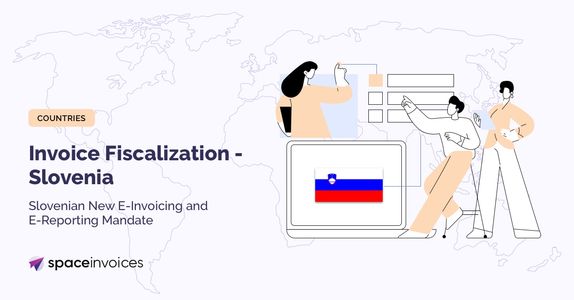Invoice Fiscalization - Slovenia
In this article, we will delve into the concept of fiscalization in Slovenia, exploring its purpose, regulations, and the implications it has for businesses operating in the country.
Slovenia was one of the first countries in Europe to adopt fiscalization, recognizing the opportunity to combat tax evasion, improve transaction reporting accuracy, and streamline business processes. Fiscalization has become an integral part of the national tax system, imposing specific requirements on businesses. In this article, we will delve into the concept of fiscalization in Slovenia, exploring its purpose, regulations, and the implications it has for businesses operating in the country. We also present potential solutions for automating fiscalization and tax compliance with powerful but simple invoicing APIs for SaaS and Internet businesses.
What is Fiscalization?
In general, fiscalization involves the integration of technology and legal frameworks to ensure compliance with tax regulations, combat tax evasion, and enhance transparency in financial transactions. Here is a helpful overview of fiscalization requirements in Europe, country-specific requirements, future trends to monitor, and API solutions available to dramatically improve productivity for companies that want to be tax compliant.
Fiscalization, in the context of Slovenia, refers to the process of electronically issuing and reporting fiscal receipts for the sale of goods and services. It involves generating unique fiscal codes for each transaction and transmitting relevant data to the Slovenian Tax Administration (STA) in real-time or periodically.

Legal Framework
The legal framework for fiscalization in Slovenia is primarily governed by the Fiscal Cash Register Act (ZDavPR). This legislation outlines the obligations, responsibilities, and technical requirements that businesses must adhere to when implementing fiscalization systems.
Technical Requirements
To comply with fiscalization regulations, businesses in Slovenia must use certified fiscal cash registers or software solutions. These systems should generate unique fiscal codes, store transaction data, and securely transmit this information to the STA. Additionally, businesses must also ensure proper invoice formatting and include specific details on the fiscal receipt.
Penalties for Non-Compliance
Failure to comply with fiscalization requirements in Slovenia can lead to significant penalties, such as fines and even business closures. It is essential for businesses to understand the consequences of non-compliance and take appropriate measures to meet the fiscalization obligations.

Future Developments
Fiscalization regulations in Slovenia are continuously evolving to adapt to changing technologies and business practices. As technology advances, the introduction of new requirements, such as online invoicing and electronic reporting, may further shape fiscalization practices in the future.
Fiscalization for SaaS and Online Business
It's important for SaaS companies in Slovenia to consult with local tax authorities or professionals to ensure compliance with the relevant tax regulations based on their specific business activities.
Solutions for Automated Invoice Fiscalization Using a Single API
Implementation of the FURS API is very complex and requires constant monitoring for changes. A very common solution is to use a unified API integrated with your SaaS or server software that automates the fiscalization process. Space Invoices is the market leader for API-based fiscalization. There are also online invoicing applications, such as getapollo.io that automate fiscalization for freelancers or small businesses with a relatively low volume of monthly invoices.

Conclusion
Invoice fiscalization requirements in Europe play a vital role in promoting tax compliance, combating tax fraud, and enhancing transparency. By understanding the specific requirements of each country and leveraging API-based solutions like Space Invoices, businesses can streamline compliance processes, generate compliant invoices, and ensure timely reporting. As fiscalization and e-invoicing continue to evolve, staying informed about future trends will be crucial for companies to adapt and thrive in the changing regulatory landscape.
Additional reading:
Start issuing Invoices, free!
Signup and start issuing compliant invoices from your software in minutes.
Or contact us to get a free implementation consultation.
